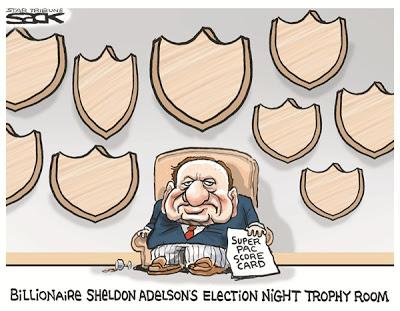 There is a lot of truth in this cartoon (by Steve Sack in the Minneapolis Star-Tribune). Ultra-rich guys like Sheldon Adelson poured hundreds of millions of dollars into Super-PAC's (with most of the money going to Romney and other Republicans) and they got nothing for their money -- except some embarrassment and a little smaller bank account.
There is a lot of truth in this cartoon (by Steve Sack in the Minneapolis Star-Tribune). Ultra-rich guys like Sheldon Adelson poured hundreds of millions of dollars into Super-PAC's (with most of the money going to Romney and other Republicans) and they got nothing for their money -- except some embarrassment and a little smaller bank account.But we can't say that nothing at all was accomplished by the super-PAC's, because they did pour a lot of money into the bank accounts of their founders and some political consultants. Some of those guys made out like bandits -- and I mean that literally. And even though the election has been over for about a month now, the super-PAC money is still flowing into a lot of pockets. It seems that there are very few rules about how the super-PAC's can spend their money.
In this election, there were 782 registered super-PAC's. Out of that number, a full 167 spent all of their money on "administrative" costs and had none left to spend on advertisements or mailings to help any candidate. Overall, the super-PAC's spent about $537.6 million, and about $88.6 million of that (nearly 16.5%) was spent on administrative costs (including six-figure salaries for founders, consultants, fundraisers, and others). Some examples are:
* Rebecca Burkett was the founder of the Newt Gingrich super-PAC called Winning Our Future. She paid herself about $480,000 -- with about half of that being paid after Gingrich was no longer a candidate. The last check she wrote to herself was just last week for $20,000.
* Gary Franchi established a super-PAC for Ron Paul called Revolution PAC. He raised about $1.2 million, and spent $1 million of that on administrative costs -- including salary for himself, rent for a facility that turned out to be a UPS mailbox, and payments to some of his own companies for various "services".
Some of the bigger super-PAC's like Karl Rove's American Crossroads paid a smaller percentage of their total funds for administrative costs -- but they raised so much more they still were able to pay consultants and fundraisers six-figure salaries.
In the final analysis, the rich contributors were sort of taken for a ride. They donated the money to get right-wingers elected, and only those in very safe districts survived. The rich got no political bang for their bucks -- but they did make a lot of PAC founders, consultants, fundraisers, and other political hangers-on a lot wealthier. I'll bet they will be a lot more careful when they consider super-PAC contributions in the future.
There was one place that none of the money went though -- none of the contributors got a refund.

